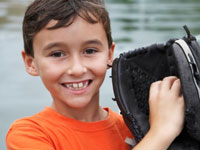The Making Of An Awesome, Most Excellent Smile

A winning smile is awesome! It's a very special part of your face. Your teeth are a big part of your smile. Keeping them in good shape helps your smile.
Taking care of your teeth is your job. Make it a habit. Here are some tips to follow for keeping your teeth, gums, and all parts of your mouth healthy. These give your mouth something to really smile about!
- Brush your teeth in the morning and at night with a fluoride toothpaste. There may be times you don't feel like it, but good brushing habits can save you from lots of problems later.
- Cavities are caused by a sticky film containing germs. It's called plaque and it coats your teeth. Plaque is nasty and needs to be brushed away at least twice a day. So if you go to bed without brushing your teeth, get up and brush! Or, if you forget to brush before going to school in the morning, rinse your mouth with water. Brush your teeth as soon as you get home.
- If you don't, you're in for a plaque attack, and that causes cavities!
- Use a tongue scraper or brush your tongue, too. Swish with water after brushing to rinse your mouth. If you're 12 years old or older, you can use a mouth rinse, too. Be careful not to swallow it. Don't swallow any toothpaste either. It's good for your teeth but not good in your tummy.
- Use dental floss or an interdental cleaner (special picks, brushes, or sticks) to clean between teeth every day. Plaque gets between teeth, too. Cleaning between your teeth removes plaque and trapped food particles your toothbrush might not get. Do it as part of your bedtime routine. Fighting tooth decay is your job.
- See your dentist twice a year for check-ups and cleanings. They have special tools that can get your teeth really clean. Think of your dentist and dental hygienist as your healthy teeth team. They like helping to keep your smile in good shape!
- Clean your teeth after snacks, even if it only means "swishing" out with water. Even healthy snacks like fruits and vegetables leave food particles and natural sugar in your teeth. Don't eat too many sweets. When you do eat sweets, brush your teeth as soon as possible. Cavity-causing germs love sweets. They start attacking your teeth right away.
- Wear a mouth protector when participating in sports. They can save your teeth from getting chipped, broken, or knocked out.
- Stay away from all tobacco products including cigarettes, cigars, and smokeless tobacco. Tobacco is very bad for your teeth, gums, lips, and mouth. Yuck! It can stain your teeth, give you sores that really hurt, and make you very sick. It's a bad habit for your whole body.
Follow these steps to an awesome smile.
- Brush teeth in the morning and at night.
- Floss every day.
- Rinse or brush after snacks.
- See your dentist for check-ups and cleanings twice a year.
- Wear a mouth protector for sports activities.
- Stay away from tobacco.
You're in charge of your teeth. Brush them. Floss them. Build strong, healthy teeth with healthy foods. Follow good health habits. You are sure to make and keep an awesome, most excellent smile!
Discover what pediatric dentistry can do for your child's smile.
by Brian J. Gray, DDS, MAGD, FICO

+Jim Du Molin is a leading Internet search expert helping individuals and families connect with the right dentist in their area. Visit his author page.
Baby Teeth: Dental Care Before The Tooth Fairy.

A child's first dental visit to the pediatric dentist is usually scheduled around his second birthday. But what happens before baby (primary) teeth fall out and the tooth fairy pays a visit is vital to a child's well being.
A healthy set of baby teeth can ensure proper facial development, and that your baby will speak and eat properly.
Whether breast-fed or bottle fed, baby gums need to be cleaned after every feeding. Simply moisten a gauze square and gently wipe away plaque. Never put a baby to bed with a bottle containing anything but water. (Read labels carefully: many infant juices contain sugar.)
After all 20 baby teeth have come in -- between 2 and 3 years – begin regular brushing. Make it a fun experience for you and your child. Beginning at about 2-1/2 years, examine your child's teeth every three months. Using a dental mirror, hold it behind the tooth surfaces and shine a penlight onto the mirror. Check for stained areas you may have missed with disclosing tablets (available at your pharmacy). If a child has a fall or is in a fight, look for any baby teeth that look blue -- a sign of injury, and call your pediatric dentist.
Research shows that kids who are brushing their teeth by the age of five will continue this habit all their lives. So give your child a head start on good dental health.

+Jim Du Molin is a leading Internet search expert helping individuals and families connect with the right dentist in their area. Visit his author page.









